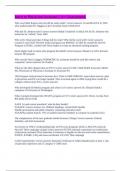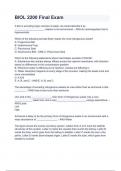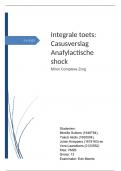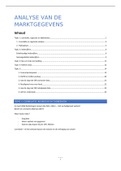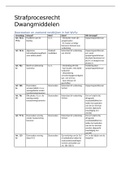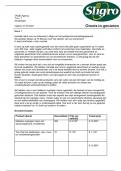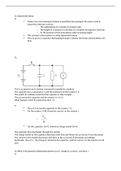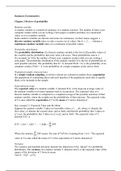Observation is the act of noting a phenomenon, often with instruments, and
recording it for scientific purposed
Ethnographers using observational techniques in their research may adopt roles
ranging from that of the complete observer to the complete participant, although
most opt for participant or membership roles that fall between these extremes
Observation is not a single act, but rather a developmental process involving:
o Site selection
o The gaining of entrée into the community
o The training of co-workers and/or local participants, as necessary
o Note-taking: structured / narrative
o Discernment of patterns
o Achievement of theoretical saturation, a state in which generic features of
new findings consistently replicate earlier ones
Reliability: a matter of systematic recording and analysis of data and the repetition
of observations regularly over a course of time
Validity: a means of determining the authenticity of the findings. It can be stated in
terms of
o Multiple observers
o Analytic induction
o Versimilitude (the appearance or semblance of truth; likelihood; probability)
Observer bias may be mitigated because observational research is natural,
emergent, and combined with other techniques
Observations carried out in public spaces are subject to stringent ethical oversight
because of the potential for abuse of subjects’ right to privacy
o It is unethical for a researcher to deliberately misrepresent his or her identity
for the purpose of entering a private domain to which he or she is not
otherwise eligible
o It is unethical for a researcher to deliberately misrepresent the character of
the research in which he or she is engaged
Hoofdstuk 2: Grounded theory research and theory building
Grounded theory is a relatively new approach to research originally defined as “the
discovery of theory from data” (Glaser & Strauss, 1967)
The originators of grounded theory, Glaser & Strauss, described the research
process as the discovery of theory through the rigors of social research
A more detailed definition by Strauss and Corbin: a grounded theory is one that is
inductively derived from the study of the phenomenon it represents. That is, it is
discovered, developed and provisionally verified through systematic data collection
and analysis of data pertaining to that phenomenon, therefore, data collecrtionm
analysis and theory stand in reciprocal relationship to one another.
Grounded theory research is discovered empirically, through induction, not
deduction.
, Theoretical sensitivity: the relevance of categories as they emerge from data comparison.
The researcher establishes emerging impressions from the evidence, conceptualizes the
data, and then analyzes emerging relationships between concepts. Theoretical sensitivity
involges repetition in data collection and analyusis and a refusal to focus on any single
theoretical perspective in advance of those concepts generated by the evidence alone.
Process of grounded theory
Although maintaining many of the traditional stages of research – plan, data collection,
analysis, reporting – the creation of grounded theory is not an entirely linear process.
The following assumptions about grounded theory research are widely shared:
The aim of grounded theory research is to generate or discover a theory
The resear4cher has set aside theoretical ideas to allow a substantive theory to
emerge
Theory focuses on how individuals interact in relation to the phenomenon under
study
Theory asserts a plausible relation between concepts and sets of concepts
Theory is derived from data acquired through fieldwork, interviews,, observations,
and documents
Data analysis is systematic and begins as soon as data become available
Data analysis proceeds through identifying categories and connecting them
Further data collection (or sampling ) is based on emerging concepts
These concdepts are developed through constant comparison with additional data
Data collection can stop when new conceptualizations emerge
Data analysis proceeds from open coding (identifying categories, properties and
dimensions) through axial coding (examingin conditions, strategies and
consequences) to selective coding around an emerging story line
The resulting theory can be reported in a narrative framework or as a set of
proportions
The following steps outline the process of grounded theory research:
Initiating research – the selection of an area of inquiry by the researcher and a
suitable site for study
Data selection – involves the location and identification of potential data sources
associated with the research question
Initiation and ongoing data collection – data collection is not time discrete but is
woven in with data analysis until the researcher has determined a point of
saturation. The researcher engages, responds, and adjusts during the process
Data analysis – involves a constant comparative method for generating and
analyzing data. The dynamics of the phenomenon under investigation make each
data analysis sub step unique.
o Initial coding, coding application, coding comparison and revision
o Checking categories, forming, applying, modifying, elaborating category
sets; clarifying concepts; describing the research process
o Defining key terms



